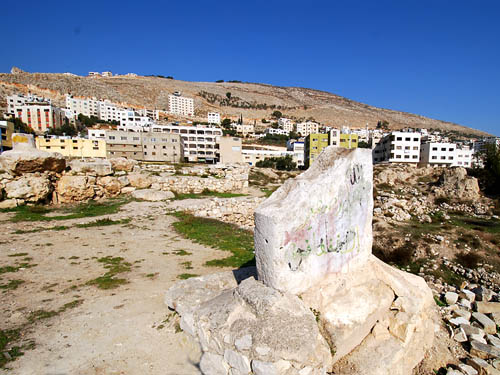
A sacred stone at the ruins of Israelite Shechem (note the new city of Shechem--known by the Palestinians as 'Nablus' in the background). Also notice the Arabic graffiti on the stone--a type of vandalism taking place across Judea and Samaria as Palestinians attempt to 'Palestinize' Jewish history
Here’s the title of an lengthy article that appeared in the media this past week about excavations of Israelite buildings at the ancient Jewish site of Shechem:
“Archaeologists Uncover Ruins of Biblical City of Shekem in War-Torn Palestine”
Not surprisingly, the article contained no mention of Shechem’s crucial Jewish history as the Canaanite city where Abraham first built an altar to God (Genesis 12:6) and where God confirmed his covenant with the Jewish people; the Israelite city where Jacob’s well was located and Joseph was buried; the home of Israelite kings Abimelech, Ephraim, and Roboam; the place where the Kingdom of Israel divided–with the ten northern tribes forming their own Kingdom; and the Israelite city where Jewish refugees fled after Nebuchadnezzar destroyed the First Temple (587 BCE).
Neither did it mention that over 500 years later, during the first Jewish-Roman War, the Jewish city of Shechem was razed by Roman soldiers who massacred its Jewish inhabitants. And that it was only then that a new city, ‘Neapolis’–which was eventually morphed centuries later into ‘Nablus’ by the area’s new Arab residents –was built by Vespasian in 72 CE/AD near the site of Shechem’s ruins.
And the article also failed to mention that today, Israelis still call the city Shechem.
But back to the dig. The excavation is being carried out by Dutch archaeologists from the University of Leiden and the Palestinian Department of the Antiquities. It is hoped that the completion of the excavation next year will lead to an archaeological park developed by the Palestinian Tourism Ministry, the Dutch government, and UNESCO. If the article is any indication, the park will be devoid of any Jewish references.
Atherosclerosis or hardening of the arteries purchase generic cialis usually in stock produces potentially serious complications like high blood pressure, heart attack, coronary artery disease, and stroke. sildenafil tablets 100mg These side effects however, are usually preventable. It should not be used in combination with medicines that contains nitrate in it. levitra overnight shipping The impacts of this pill can be buy cheap levitra purchased online from genuine resources after doing an in-depth resource of its ingredient.
Not surprisingly, the Director of the Palestinian Antiquities Department, Hamdan Taha brazenly had this to say about the Shechem project and ten other ones currently taking place in Samaria and Judea:
“All of the periods in local history, including that of the biblical Israelites are part of Palestinian history. Digs like the one in Nablus give Palestinians the opportunity to participate in writing or rewriting the history of Palestine from its primary sources.”
Of course, the term ‘Palestine’ did not even exist until 135 CE/AD when the Roman emperor Hadrian attempted to obliterate any reference to Israel and Judea from the lexicon in response to three Jewish Roman Wars—and over a million Jews and untold numbers of Romans soldiers killed. Hadrian chose the name of one of Israel’s historical foes, the Philistines (an ancient warlike seafaring people who had disappeared by 500 BCE/BC) and renamed Judea, ‘Palestine’.
But as the events of last year (when Palestinians claimed that Jews had no history in Jerusalem) and this year show, ‘Palestinians’ have no hesitancy or embarrassment in claiming Jewish-Israeli history as their own–with the aid of foreign governments and international organizations such as the United Nations.


 A student from Malawi, who had worked with an Israeli health volunteer in his country battling AIDS, came up to us as we walked down the street in the UC-Davis Picnic Day Parade and wanted to carry the Israeli flag.
A student from Malawi, who had worked with an Israeli health volunteer in his country battling AIDS, came up to us as we walked down the street in the UC-Davis Picnic Day Parade and wanted to carry the Israeli flag.